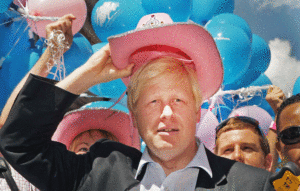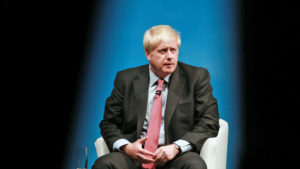We are in the summer of 2032, and once again Boris Johnson is fighting for his life. Above Downing Street the carrion crows circle, as they have so often in the last 13 years. Once again a senior minister has walked out. Once again the headlines are full of lies and evasions, sleaze and scandal.
After four resignations in little more than a decade, the Sky camera crew outside Sajid Javid’s London home have become friends of the family. Rebellious backbenchers look to Michael Gove to wield the dagger; as always, he remains inscrutable. Television pictures show Steve Barclay emerging from Number 10 with his 27th Cabinet job in barely a decade, while the disgraced Matt Hancock is reportedly eyeing a fresh comeback. On Radio Four, the 99-year-old Lord Heseltine is talking about Brexit. On Twitter, Foreign Secretary Nadine Dorries pledges her loyalty to the PM. Everything is safe, solid and unquestionable. Everything will be the same for ever and ever.
Is that, perhaps, how Boris Johnson’s remaining loyalists imagine the future? Alas, I have news for them. David Cameron may have compared his Old Etonian rival with a greased piglet, forever wriggling away from the most excruciating scrapes, but even the most sebaceous porker ends up on the breakfast table eventually. And even by Boris’s standards, to lose a Chancellor and a Health Secretary in a single evening, as well as a gaggle of parliamentary aides and trade envoys, represents a sensational and surely fatal humiliation.
True, Harold Macmillan lost his entire Treasury team in 1958, but he was riding high in the polls and few people knew who the Chancellor was anyway. (Peter Thorneycroft, if you’re wondering.) And yes, Margaret Thatcher soldiered on for another year after losing Nigel Lawson in 1989. But in retrospect, it’s obvious she was doomed. So even if, by some miracle of escapology, Johnson clings on until the end of the week and then through the summer, before defying his backbench critics to soldier on to the party conference and beyond, it’s almost impossible to imagine him lasting to the next General Election.
And what if he does? Electoral oblivion, surely. Divided parties very rarely win elections, and it’s hard to see Tory England voting once again for a man whom Jeremy Hunt, Rishi Sunak, Sajid Javid, David Davis and Steve Baker, to name but five, have explicitly told them is not up to it. So why bother? What’s the point?
For his critics, Johnson’s fall has been coming from the first. In the summer of 2019, before he had even laid hands on the crown, his former editor Max Hastings predicted that his premiership would “almost certainly reveal a contempt for rules, precedent, order and stability”. Johnson, he wrote, would surely “come to regret securing the prize for which he has struggled so long, because the experience of the premiership will lay bare his absolute unfitness for it”.
Was this just a patrician Tory Remainer talking? Not really. That same summer, another of Johnson’s old newspaper colleagues, the Brexit ultra Simon Heffer, warned that Tory party members would soon tire of his “indolence, casualness, monstrous selfishness, lack of attention to detail, incompetence and monumental dishonesty”. And even if Johnson won an election, wrote Heffer, “no one should bet on him shaping the destiny of Britain and her people for much more than a brief, and possibly deeply troubling, interlude”.
There is, perhaps, another side of the picture. Detached from the hurly-burly of our present arguments, future historians may well be struck by Johnson’s formidable, if ephemeral, strengths as a communicator and campaigner. His roguishness, his showmanship, his patriotic populism may have enraged the bien-pensant — as well as his own former colleagues — but they clearly struck a chord with millions of ordinary Britons who had little interest in the niceties of politics.
In a thoughtful analysis after his crushing General Election victory in 2019, the Cambridge academic Helen Thompson wrote almost approvingly of “his willingness to enter the realm of risk, his eagerness to trade his dignity, his indifference to conventional pieties and mundane detail”, all of which she traced to his “pagan energy”. And in another acute profile, published last year, Tom McTague argued that Johnson “understands the art of politics better than his critics and rivals do”. Johnson was right, he wrote, to see that politics was “a battle to write the national story, and that this requires offering people hope and agency, a sense of optimism and pride in place. He has shown that he is a master at finding the story voters want to hear.”
These articles have an ironic ring today, amid the risible chaos of the fin de régime. But they weren’t necessarily wrong. Much as his critics loathed Johnson’s populist persona, he won elections. But that shouldn’t be a surprise. British political history, even at the highest level, is littered with rogues and showmen, from Palmerston and Disraeli to Lloyd George and Blair. They weren’t just rogues and showmen, of course: that was why they were so successful. Energy, optimism, a gift for storytelling, a sense of humour: these are hardly negligible qualities for somebody hoping to become prime minister.
No less an observer than Karl Marx once called Palmerston “an exceedingly happy joker” who “ingratiates himself with everybody”. “When unable to master a subject, he knows how to play with it,” said Marx. “If wanting in general views, he is always ready to weave a web of elegant generalities.” That sounds pretty familiar. Yet plenty of ordinary voters adored Palmerston as the bluff incarnation of British patriotism, forever sticking it to the priggish and prissy Macrons and von der Leyens of the mid-19th-century world. One observer spotted him visiting the Great Exhibition in 1851. “The moment he came in sight,” he wrote, “throughout the whole building, men and women, young and old, at once were struck as by an electric shock. ‘Lord Palmerston! Here is Lord Palmerston! Bravo! Hurrah! Lord Palmerston for ever!’’”
The problem is that in the 21st century, merely playing Lord Palmerston — or even Johnson’s supposed hero, Winston Churchill — can never be enough. The scope of government has widened far beyond what either man imagined possible, and a modern Prime Minister is responsible for a bureaucratic machine that touches almost every aspect of seventy million people’s lives.
Johnson’s government didn’t get everything wrong: when his defenders point to the vaccine rollout or his support for Ukraine, they have a point. But surely, alone with his confessor, even Jacob Rees-Mogg would admit that the conduct of affairs inside Downing Street has been an utter, utter shambles. Britain has had plenty of inept and sleazy governments before, but very few with such a palpable lack of ideological direction and such a basic indifference to organisational competence. Even those infamous parties, judging by the photos, had a forlorn and hapless look, unworthy of a venue that has seen some pretty heroic drinking in its time. A glass of cut-price Chardonnay with the Big Dog and his teenage groupies, or a double Scotch and a tirade about socialism from the Iron Lady? I know which I’d prefer.
It really didn’t have to be this way, though. Recent history offers some excellent examples of political showmen who ran competent, efficient administrations, largely by standing back and letting the professionals deal with the nuts and bolts. When Ronald Reagan became President of the United States in January 1981, his critics derided him as a mere Hollywood has-been. They mocked him as a know-nothing, an airhead, coasting to disaster on clouds of his own optimism and good humour.
Even his closest international soulmate, Margaret Thatcher, sometimes despaired of his spectacular inattention to detail. Her Foreign Secretary, Lord Carrington, once recalled that after they had endured Reagan’s thoughts about South Africa during their first visit to the White House (“Well of course, the South Africans are whites and they fought for us during the war. The blacks are black and they are Communists”) she left the Oval Office, pulled him aside and pointed at her head. “Peter,” she whispered in horror, “there’s nothing there!”
But Reagan was no fool. He surrounded himself with some of the biggest beasts in the Republican jungle: George Bush, Al Haig, James Baker, George Shultz, Caspar Weinberger, hard-nosed operators who knew how the machine worked and how to get things done. That took a degree of psychological security, even humility: it often meant Reagan was the least bright and least well-informed person in the room. But he didn’t mind. It left him free to play the part that came most naturally: the jolly, sunny, patriotic father of the nation, always ready to disarm his opponents with a rousing story, a Hollywood anecdote or — in private — a dirty joke. And it worked. He won elections — and even his adversaries secretly liked him.
Has Britain ever had a politician like Reagan? Well, I can think of one obvious example: another good-humoured, amusing, patriotic fellow, who liked nothing better than to make voters laugh and put them at ease. He too was dismissed by his critics as a mere screen performer, a charismatic joker who knew nothing of economics and was indifferent to details. But ordinary voters, whether diehard Tories or traditional Labour, liked him, and twice elected him to run their capital city. And while he rolled out the crowd-pleasing rib-ticklers, he had a team of serious, professional operators to keep things ticking over behind the scenes. His name, of course, was Boris Johnson.
Why didn’t Boris Johnson learn from Boris Johnson? Why didn’t he run Britain as he had once run London? For me, that’s the really baffling question. Why didn’t he play the British Reagan? Why didn’t he surround himself from the first with genuinely seasoned, clever, ruthless people, as Reagan did — or as Thatcher, Clement Attlee and his hero Churchill did? Why employ Gavin Williamson? Why associate with Nadine Dorries? What can possibly explain the Cabinet career of Jacob Rees-Mogg? An elaborate bet? A practical joke that got wildly out of hand?
Ask people who know Johnson well, and you get different answers. Some suggest that deep down, he has always been intensely insecure — something that’s true of many politicians, but wasn’t true of Reagan or Thatcher — and that he dreaded surrounding himself with rivals and potential successors. Others point to the breakdown of his marriage to Marina Wheeler in 2018, insisting that she was his rock, his anchor, his source of psychological stability and political sense.
But perhaps there’s a simpler explanation, less grounded in amateur psychology, but none the less thematically satisfying. It may be that Boris Johnson’s capacity to play the British Reagan vanished some time between midnight and dawn on 24 June 2016, as it became clear that Britain had voted to leave the European Union. For as the sun rose that morning, just under half of the country vowed that it would never forget and never forgive. They blamed Gove, they blamed Farage, but above all they blamed Johnson. And with that, the part of the national conciliator, the amiable patriotic showman, was lost to him forever. He tried out for other parts, of course: the Brexit deal-maker, the Whitehall party-planner, the East African travel agent. But none of them really worked out. All his life he had been preparing to play a single role — and in the very act of securing it, he lost it forever.
So perhaps, in the end, he was just another victim of Brexit. As a former classical scholar, he might appreciate the irony.
Disclaimer
Some of the posts we share are controversial and we do not necessarily agree with them in the whole extend. Sometimes we agree with the content or part of it but we do not agree with the narration or language. Nevertheless we find them somehow interesting, valuable and/or informative or we share them, because we strongly believe in freedom of speech, free press and journalism. We strongly encourage you to have a critical approach to all the content, do your own research and analysis to build your own opinion.
We would be glad to have your feedback.
Source: UnHerd Read the original article here: https://unherd.com




